Whether you like the word or not, in business we are all salespeople. It’s our job to sell our product or service – otherwise, we just don’t have a business.
But I have found that the best salespeople don’t feel like salespeople at all. The more you push, pitch, and pressure, the less effective you become.
Why? Because people love to buy – but they hate being sold to. It’s a paradox that has tripped up even the most seasoned professionals.
Think about it. Have you ever walked into a shop just to browse, only to have a pushy salesperson latch onto you? What’s your instinct? Probably to make a quick exit.
Now, contrast that with an experience where someone simply asked about your needs, offered insights, and made you feel like the decision was entirely yours. That’s the magic of great selling – it doesn’t feel like selling at all.
So, what’s the secret?
Shift from selling to helping
The best salespeople have two great qualities: (i) they care deeply about their customers and (ii) they are passionate about the benefits to their customers of their product or service.
Instead of convincing, focus on understanding. Instead of talking, listen. The best salespeople aren’t just persuasive; they’re curious, empathetic, ask great questions and are genuinely interested in solving problems. They build relationships, not just transactions.
And here’s the thing: this applies to all of us. Whether you’re an entrepreneur, a consultant, or even job hunting, you’re constantly selling whether that’s your ideas, your expertise, yourself. And the less you push, the more people lean in.
Five common pitfalls in selling
Selling is an art, but even the best make mistakes. The good news? Most are easily fixable. Here are five common pitfalls and how to avoid them.
-
Talking too much
Ever met a salesperson who won’t stop talking? Instead of impressing the buyer, they overwhelm them. Instead, relax and listen more than you speak. Ask open-ended questions, let the customer tell you about their needs, and respond accordingly.
-
Focusing on features, not benefits
Customers don’t buy features – they buy solutions. When you ask questions and understand the problem you can explain how your product or service will resolve that problem. Make it about them.
-
Ignoring the emotional side of buying
People buy emotionally and justify logically. If we only focus on logic, we’ll lose sales. Understand your customers’ pain points, and the impact on them of those pain points, show empathy, and create an emotional connection.
-
Fearing the price conversation
Many salespeople hesitate when it’s time to talk about price. Instead of dodging the topic, be sure to communicate the value with confidence. If your solution is truly worth it, price becomes secondary.
-
Not following up
Many deals don’t close on the first conversation and many are lost simply because the salesperson never follows up. Be sure to create a structured follow-up process and stay engaged.
Great selling isn’t about being perfect. It’s about learning, adapting, and improving. The best sales come not from pushing harder but from making it easier for others to say, “Yes.”



